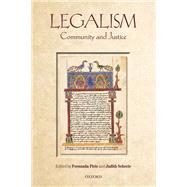- ISBN: 9780198716570 | 0198716575
- Cover: Hardcover
- Copyright: 9/30/2014
'Community' and 'justice' recur in anthropological, historical, and legal scholarship, yet as concepts they are notoriously slippery. Historians and lawyers look to anthropologists as 'community specialists', but anthropologists often avoid the concept through circumlocution: although much used (and abused) by historians, legal thinkers, and political philosophers, the term remains strikingly indeterminate and often morally overdetermined. 'Justice', meanwhile, is elusive, alternately invoked as the goal of contemporary political theorizing, and wrapped in obscure philosophical controversy. A conceptual knot emerges in much legal and political thought between law, justice, and community, but theories abound, without any agreement over concepts.
The contributors to this volume use empirical case studies to unpick threads of this knot. Local codes from Anglo-Saxon England, north Africa, and medieval Armenia indicate disjunctions between community boundaries and the subjects of local rules and categories; processes of justice from early modern Europe to eastern Tibet suggest new ways of conceptualizing the relationship between law and justice; and practices of exile that recur throughout the world illustrate contingent formulations of community. In the first book in the series, Legalism: Anthropology and History, law was addressed through a focus on local legal categories as conceptual tools. Here this approach is extended to the ideas and ideals of justice and community. Rigorous cross-cultural comparison allows the contributors to avoid normative assumptions, while opening new avenues of inquiry for lawyers, anthropologists, and historians alike.
The contributors to this volume use empirical case studies to unpick threads of this knot. Local codes from Anglo-Saxon England, north Africa, and medieval Armenia indicate disjunctions between community boundaries and the subjects of local rules and categories; processes of justice from early modern Europe to eastern Tibet suggest new ways of conceptualizing the relationship between law and justice; and practices of exile that recur throughout the world illustrate contingent formulations of community. In the first book in the series, Legalism: Anthropology and History, law was addressed through a focus on local legal categories as conceptual tools. Here this approach is extended to the ideas and ideals of justice and community. Rigorous cross-cultural comparison allows the contributors to avoid normative assumptions, while opening new avenues of inquiry for lawyers, anthropologists, and historians alike.






